'We will be ready for them': New England could become post-Roe safe haven for abortion
After packing suitcases with clothes for just a few days, they've boarded airplanes, trains and buses. Their destinations vary — Massachusetts or Connecticut, perhaps. Far away places where they will end their pregnancies.
These journeys have been happening since last September, when Texas prohibited abortions after detection of a fetal heartbeat. "We have already seen patients traveling thousands of miles to access abortion care," said Amanda Skinner, CEO of Planned Parenthood of Southern New England.
The influx of the last several months was the result of just one state's law. Now, 26 states are certain or likely to ban abortion following the U.S. Supreme Court's overturn of the landmark 1973 case Roe v. Wade last Friday.

New England is a port in the storm — an abortion care access point where all six states allow the procedure and a majority have protected the right to it.
Abortion providers and advocates anticipate the region will become a haven of sorts for that reason — a safe harbor for pregnant people living in the many states where abortion is now illegal or heavily restricted.
Abortion rights in Massachusetts were strengthened: Here's what Gov. Baker did after Roe.
"The impact is not a future impact, it's happening now," said Rebecca Hart Holder, executive director of Massachusetts nonprofit Reproductive Equity Now. "It will be a wave."
After Friday's ruling, Massachusetts Gov. Charlie Baker proclaimed the state will not cooperate with other states' investigations into abortions performed there. His executive order protects providers who perform abortions for out-of-state individuals and the individuals themselves. Lawmakers are now working to codify the order as state law.

Rhode Island Gov. Dan McKee is planning a similar executive order to protect abortion providers, and Connecticut has a new law going into effect July 1.
Vermont might become the first state in the country to include abortion rights in its constitution, if voters elect to do so during November's general election.
RI governor plans executive order to protect state's abortion providers
Over the weekend, New England providers started seeing an uptick in phone calls from across the country.
"Some of our folks in Massachusetts looking for reassurance, and a number of phone calls from states like Texas, Utah, Indiana," said Dr. Jennifer Childs-Roshak, CEO and president of Planned Parenthood League of Massachusetts. "They start calling 800 numbers and looking for any information they can get."
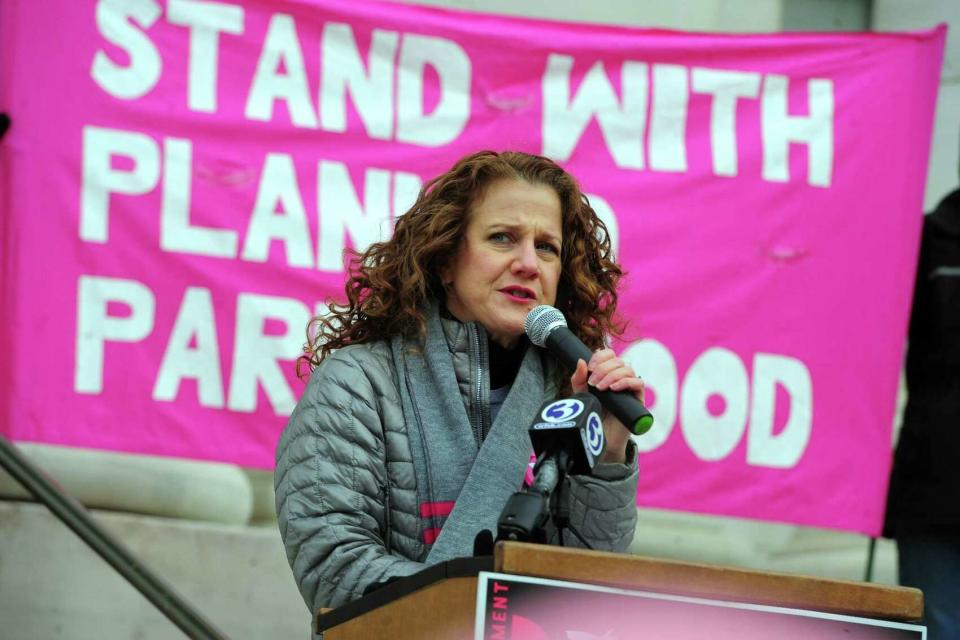
Planned Parenthood centers in Connecticut and Rhode Island are "staffing up and considering expanded office hours and days we're able to provide services," said Skinner.
"We're going to have to really understand the reality of the increased demand we see, and be nimble," she said.
What states have banned abortion?
According to an October analysis from the Guttmacher Institute — a research and policy organization working to advancing sexual and reproductive health and rights — 26 states are certain or likely to ban or heavily restrict abortion now that Roe v. Wade has been overturned: Alabama, Arizona, Arkansas, Florida, Georgia, Idaho, Indiana, Iowa, Kentucky, Louisiana, Michigan, Mississippi, Missouri, Montana, Nebraska, North Dakota, Ohio, Oklahoma, South Carolina, South Dakota, Tennessee, Texas, Utah, West Virginia, Wisconsin and Wyoming.
What are 'trigger laws?': Supreme Court ruling triggers maze of state abortion laws
Florida, North Carolina: These states could be pivotal for post-Roe abortion access
Some states had "trigger laws" in place in preparation for the Supreme Court decision — laws that would be set in motion once an overturn occurred. Bans in Kentucky, Louisiana and South Dakota went into effect immediately last Friday. Trigger bans in other states, such as Wyoming, Tennessee, Texas and Idaho, are expected to go into effect in the coming days and weeks.
This week, state judges temporarily blocked bans in Louisiana and Utah.
What states have protected abortion access?
Sixteen states and the District of Columbia currently have laws that protect the right to abortion, including five of the six New England states. Abortion is legal in New Hampshire, with restrictions, but the state has not passed a law protecting abortion access.
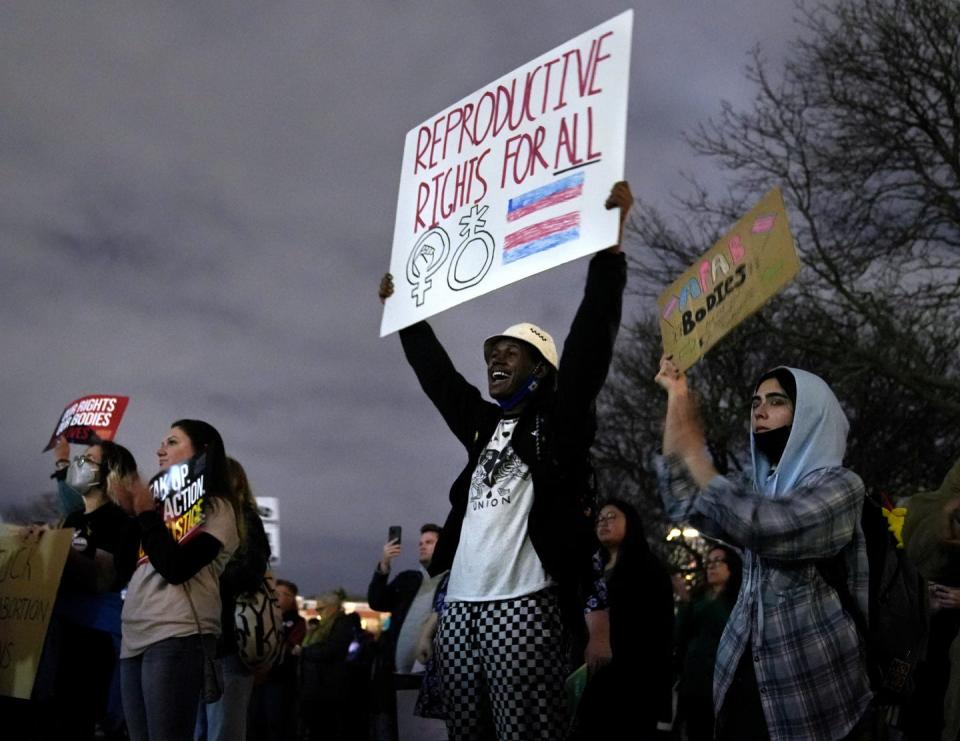
Two New England states — Connecticut and Maine — have expanded abortion access.
Connecticut's Reproductive Freedom Defense Act goes into effect on July 1, expanding the pool of clinicians who can perform abortions and legally protecting medical providers and patients traveling to Connecticut seeking abortion care.
In 2019, Maine passed two laws expanding abortion access, including allowing non-doctor medical professionals to perform abortions and authorizing state funding for abortions for Medicaid recipients.
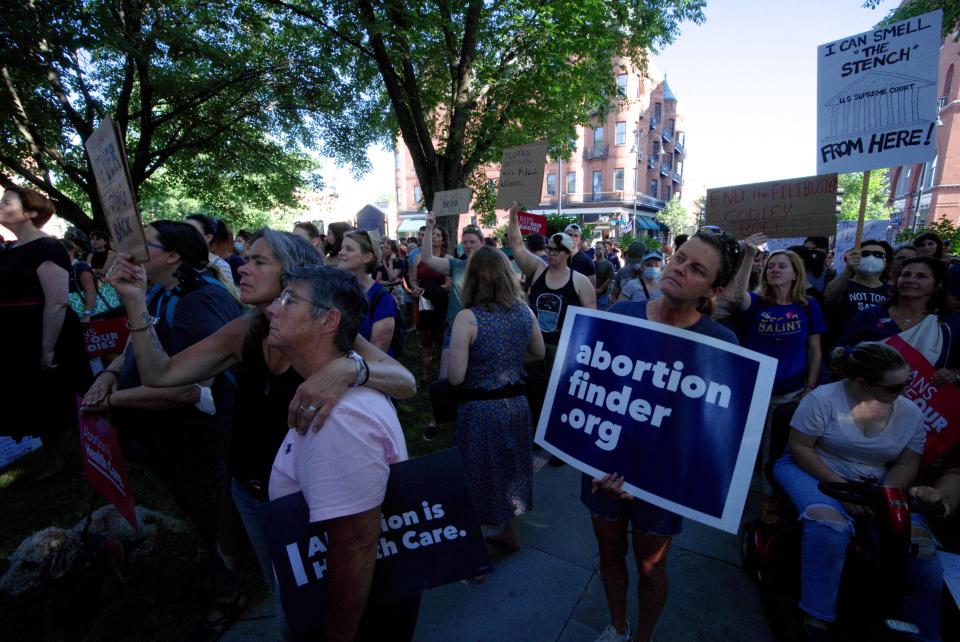
New England prepares for 'wave' of abortion patients after Roe v. Wade overturn
Hart Holder spoke with a colleague in Missouri after the ruling, where a ban was enacted that day. Prior, Missouri's one abortion clinic had a six-week wait. Now, neighboring Illinois is expected to see a 250% increase in people seeking abortions, she said.
It's a domino effect that will stretch nationwide.
"This is going to be a continuous strain on Massachusetts," said Hart Holder. "We need to understand the scope of the crisis. It's been happening since September, but it's not like the switch we flipped on Friday."
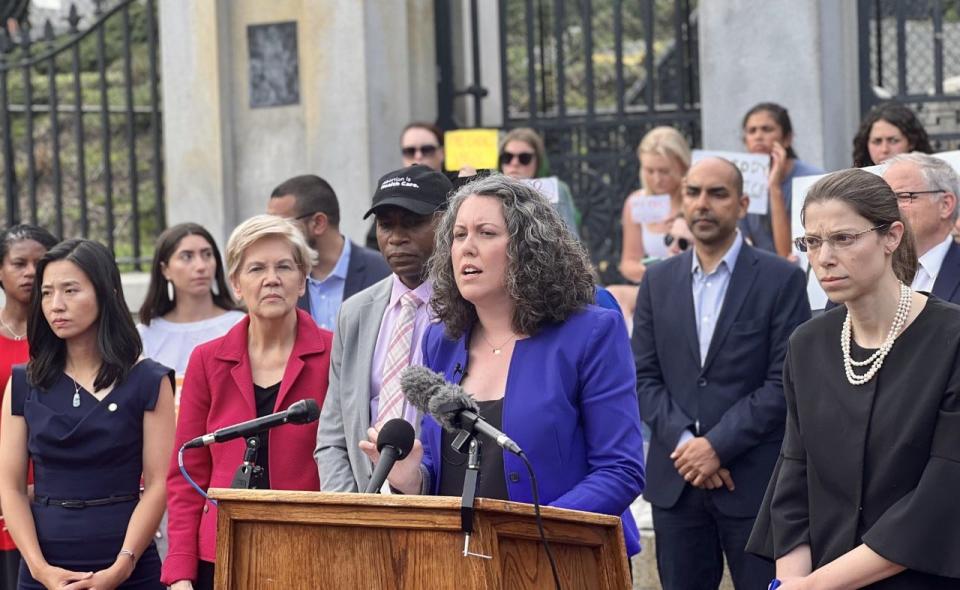
Much of New England's abortion care infrastructure is already constrained. Skinner said their health centers in Connecticut had an "unacceptable" two-week wait before the Roe overturn.
Kayla Montgomery, CEO of Planned Parenthood of Northern New England in New Hampshire, Maine and Vermont, said they, too, have seen patients from Texas over the last several months. Time will tell what comes next, but their providers are committed to giving care to anyone who needs it, she said, "regardless of zip code."
Will NH, Maine see abortion patients from out of state?: Providers are 'committed' to help
Patients seeking an abortion out-of-state are taking several factors into account, providers said, including the availability of direct flights and presence of friends or family.
Skinner said three of their clinics are within a 20-minute drive from airports in Providence, Rhode Island and New Haven and Hartford, Connecticut.
"We've been hearing it's about the ability to get to the place," she said. "People are also going where they have a support network. And then they're going where the abortion provider can meet their needs and timeline."
Childs-Roshak believes Massachusetts' reputation as a national leader in healthcare will alone be a draw for people seeking services.
"And we will be ready for them," she said.
Millions are without travel options for accessing abortion
While boarding an airplane or buying a train ticket may be convenient for some, Skinner noted it's "absolutely critical" to talk about the populations unable to travel hundreds or thousands of miles for healthcare. In most cases, they're the same people who've already been disproportionately impacted for years.
In 2018, a study by the Bixby Center for Global Reproductive Health found that 27 states in the U.S. qualified as “abortion deserts” — cities where people had to travel 100 miles or more to reach an abortion clinic. At the time, six states had only one abortion facility.
In Massachusetts:Cape Cod lacks abortion clinics
"There are large rural communities, communities of color, communities where people live in poverty," Skinner said. "I think it is important to underscore the hurdles they're going to face to access care. The potential consequences of this, the public health outcomes that could follow, could be devastating for millions."
Many people are challenged to finance a procedure within their state, let alone across state lines. Skinner noted factors such as lack of paid time off and childcare as other barriers.
Donations, Airbnbs offering free lodging, and people volunteering to drive still won't be enough to support the demand coming from marginalized populations, said Childs-Roshak, "the people who need it most."
What is the abortion pill?: What to know after the Supreme Court overturn
For this reason, providers are working to get the word out about medication abortion — which is already used in at least 54% of terminated pregnancies in the U.S. The pills are regulated by the federal Food and Drug Administration, not by individual states. Patients can obtain the pills via telehealth visits and mail, though some states have tried to curb access by outlawing telehealth to obtain a prescription from a provider.
"Getting medication into the hands of folks as soon as they realize they need abortion care is going to be critical to prevent people from traveling," said Hart Holder.
Abortion funds anticipate increase in requests for help post-Roe
When a pregnant person can't travel to access an abortion, or doesn't have the money for pay for the procedure in general, that's where abortion funds come in.
Abortion funds work to remove financial and logistical barriers to abortion access. They exist in all 50 states as part of The National Network of Abortion Funds. A message on the organization's website currently states they are experiencing "unprecedented traffic."
What to know: Supreme Court overturning Roe sparks rapid law changes, confusion and uncertainty
From July 2019 to June 2020, abortion funds helped 81,692 people nationally, according to the network.
The average cost of an abortion is $500. Leah Cohen, outreach and community director for the Reproductive Freedom Fund of New Hampshire, noted 40% of Americans can't afford a surprise medical bill more than $400.
Anticipating an increase in requests and the need for travel, abortion funds have been working overtime to prepare for the Roe decision, said Cohen.
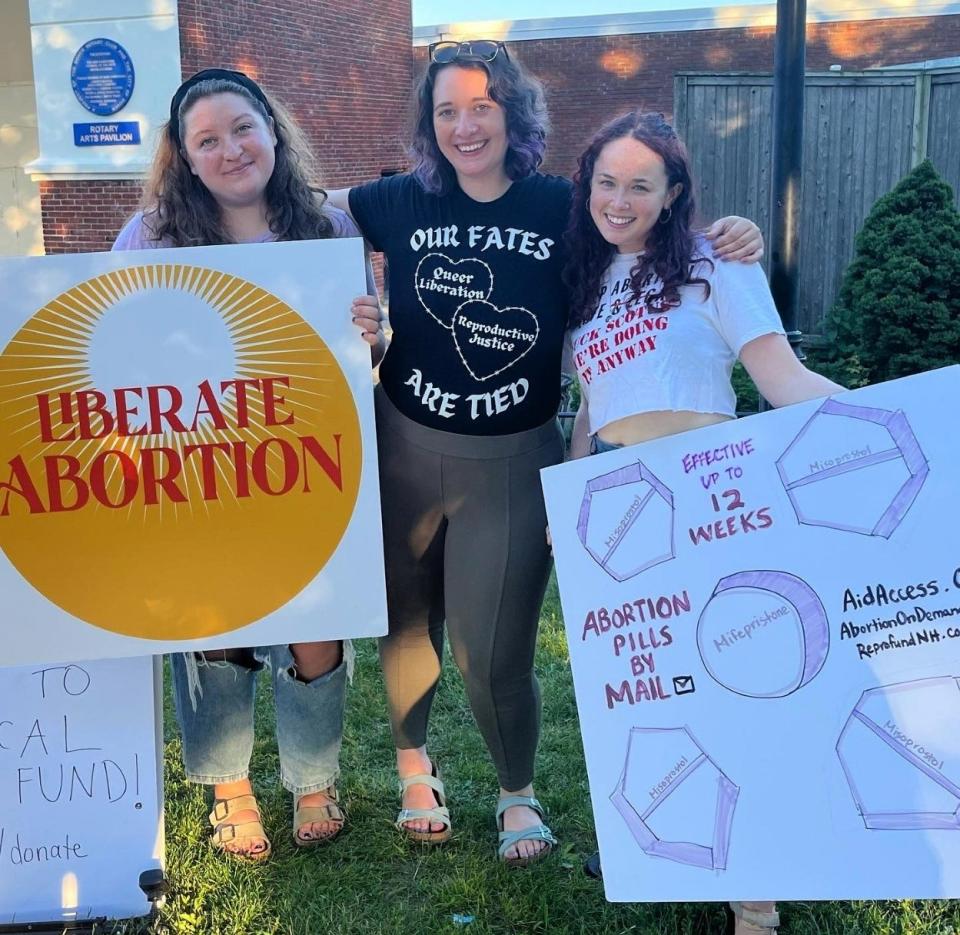
Over the last year-and-a-half, the New Hampshire fund has supported 250 patients with $100,000 in abortion care. Now, they're working to scale up their ride-share program, provide mutual aid, such as hotel stays and childcare, and expand their collaboration with funds in other states, particularly those that have lost abortion access.
The fund has helped patients travel from New Hampshire to Massachusetts in the last few months, Cohen said, because of how overwhelmed clinics are in northern New England. Just recently, they had a 24-hour turnaround to find transportation for a patient to Springfield, Massachusetts, "a really hectic process" that involved four different drivers and multiple drop-off points.
Earlier this year: Exception added to New Hampshire's 24-week abortion ban with Sununu signature
Cohen said it was a preparation of sorts for the expected chaos about to unfold.
"In post-Roe America, people can donate to their local abortion fund," said Cohen. "If you don't have the means to donate right now, there's a lot of other ways you can help support our work. We've seen students hosting their own fundraisers. If you have a car and you're willing to drive, we're accepting new volunteers. If you've had an abortion and you'd like to share your story with us, we're always welcoming in more storytellers for our narrative work."
The Eastern Massachusetts Abortion Fund is "stunned and angry, but we are mobilized and connected and determined," said board member Margaret Batten.
Their fund is already seeing an increase in donations, she said, and there's an "unprecedented level of collaboration" happening between funds across state lines and regionally.
Need help getting an abortion?: Social media flooded with resources after Roe reversal
Of Massachusetts, Batten said, "We have the providers, we have the funding, we have the protections, and we have a really connected network of people ready and able."
A reproductive health care spending bill could soon head to Baker's desk, which Batten noted includes $2 million for access, including grants to the state's abortion funds. Advocates have said this would be the first time in state history the annual budget invests in grassroots abortion fund organizations.
Anti-abortion activists don't want New England to become abortion 'hub'
In a statement released Friday after the Supreme Court ruling, a Massachusetts anti-abortion organization celebrated the end to federal abortion protections, while decrying perceived efforts to make Boston a "hub" for the procedure.
In an interview this week, Andrew Beckwith, president at the Massachusetts Family Institute, said while the overturn was a victory for his organization, he's "disturbed" by "aggressive" efforts to make the state a "hub" or "beacon" for abortion, referencing proposed legislation lawmakers are set to take up this week that would capitalize on Baker's executive order.
Baker inks executive order keeping abortion legal under Mass. law: In wake of Roe v. Wade overturn by US Supreme Court
"It is an attempt to essentially invalidate the laws of other states by making Massachusetts a legal loophole for abortion," he said. "We will certainly do whatever we can to oppose it."
Abortion remains safe and legal in New England, providers emphasized. But Hart Holder warned against the use of words like "sanctuary," calling the possibility of a federal abortion ban "very real."
"Those of us in states like Massachusetts do ourselves a disservice if we are not very aware of the threat if anti-choice senators take over the U.S. Senate," she said.
This article originally appeared on USA TODAY NETWORK: Abortion in New England expected to go up after Roe v. Wade overturn

